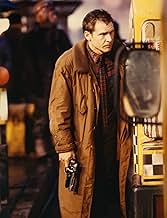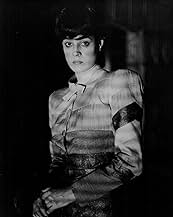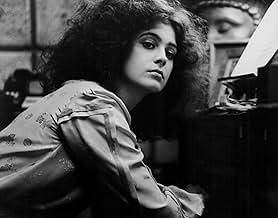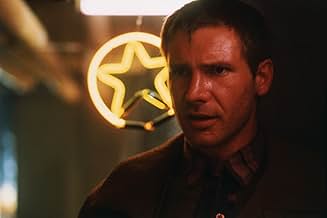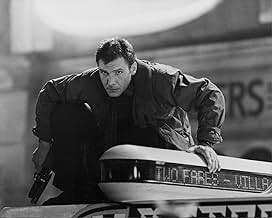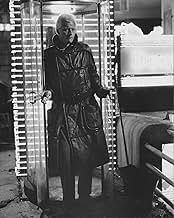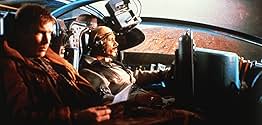Ein Blade Runner muss vier Replikanten verfolgen und versuchen, sie zu eliminieren, weil sie ein Raumschiff gestohlen haben und zur Erde zurückgekehrt sind, um ihren Schöpfer zu finden.Ein Blade Runner muss vier Replikanten verfolgen und versuchen, sie zu eliminieren, weil sie ein Raumschiff gestohlen haben und zur Erde zurückgekehrt sind, um ihren Schöpfer zu finden.Ein Blade Runner muss vier Replikanten verfolgen und versuchen, sie zu eliminieren, weil sie ein Raumschiff gestohlen haben und zur Erde zurückgekehrt sind, um ihren Schöpfer zu finden.
- Regie
- Drehbuch
- Hauptbesetzung
- Für 2 Oscars nominiert
- 13 Gewinne & 22 Nominierungen insgesamt
Kimiko Hiroshige
- Cambodian Lady
- (as Kimiro Hiroshige)
Bob Okazaki
- Sushi Master
- (as Robert Okazaki)
Zusammenfassung
Reviewers say 'Blade Runner' is acclaimed for its deep themes, striking visuals, and intricate story, often noting its examination of humanity, identity, and artificial life ethics. Many commend its philosophical richness and immersive world, blending film noir with sci-fi. However, some find the pacing slow and characters underdeveloped. Debate exists over different cuts, with preferences varying between the original and director's cut. The soundtrack and special effects, though innovative, receive mixed reviews, with some considering them dated or mood-dependent.
Empfohlene Bewertungen
What can be said about this film that hasn't already been covered in preceding decennia? Blade Runner (either version) stands the test of time as an epic story which transcends a disparity of genres, as well as the seminal "dark" sci-fi film which has been mimicked so frequently (to varying degrees of success) since its original release. The interplay of film noir, sci-fi, and what is one of the most philosophically symbolic and academically analyzed narratives of the modern era holds its ground on both visual and cerebral levels even in the face of today's CGI laden blockbusters. The new director's cut, contrary to many cinematic re-hashings, actually serves to clarify many of the more nebulous aspects of the plot and makes a great film even better, arguably allowing it to be modernized and polished for a new generation of viewers who are more picky and yet simultaneously less idealistic. All while sustaining the feeling and flavor of the original. Call it restorative work if you will. The tinny and meandering score by Vangelis is pure 1980s at its most brooding and fits the texture and mood of the film beautifully. Indeed, for many reasons, finding this film in someone's DVD collection makes a true statement about their discriminating and refined taste in movies, and equally their appreciation of film as an artistic medium. I would suggest picking up a reader by someone like Nietzsche, Foucualt, Descartes, Kierkegaard, or any of the great existentialist philosophers after viewing this film in order to appreciate the story & its concepts at a whole new level, regardless if you're watching it for either the 1st, or the 100th time. An enduring classic and an intrepid piece of film-making with rich & often haunting visuals designed to entertain and promote introspection amongst its viewers. 9/10.
Blade Runner describes a future in which, through genetics, artificial humans are manufactured and called "replicants"; employees in dangerous jobs and slaves in the outer colonies of the Earth. Made by Tyrell Corporation under the motto "more humans than humans" -especially the "Nexus-6" models- not only resembles humans, they are far superior physically.
The replicants were declared illegal on planet Earth after a bloody mutiny occurred on the planet Mars, where they worked as slaves. A special police force, Blade Runners, is in charge of identifying, tracking and killing - or "withdrawing", in terms of the police itself - the fugitive replicants found on Earth. With a group of replicants loose in Los Angeles, Rick Deckard, the best agent that has existed in regard to the recovery and removal of the replicas, is removed from his semi-retirement to use some of "the old magic blade runner".
Ridley Scott fantastic dark cyberpunk style and futuristic design is so well made that accomplished to create a visual vocabulary: neon lights, abandonment, decay, loneliness, obscurity, indifference and alienation are the core of the aesthetics of the film, which will eventually become and serve as a pattern for successive cinematographic works.
The script David Webb Peoples adapted from 'Do Androids Dream of Electric Sheep?' takes the viewer into a dwelling and philosophical controversy, as it creates doubt and empathy to the so called replicants, primarily as seen in many shots of Rick Deckard hesitating about the true nature of his task.
Harrison Ford and Rutger Hauer haunts the attention into the essence of the story. Their characterization throughout infiltrates the different conceptions of life. A saddened soul searching for the meaning of his punished existence and the other, ruminating a task sinking him into a moral void brimming with guilt.
At the end, the movie leaves you wondering about the implications the creation of highly intelligent beings (IA) must have and, if it's worth treating them as machines or they have become so human that the difference is non existent.
"Time... to die".
10/10.
The replicants were declared illegal on planet Earth after a bloody mutiny occurred on the planet Mars, where they worked as slaves. A special police force, Blade Runners, is in charge of identifying, tracking and killing - or "withdrawing", in terms of the police itself - the fugitive replicants found on Earth. With a group of replicants loose in Los Angeles, Rick Deckard, the best agent that has existed in regard to the recovery and removal of the replicas, is removed from his semi-retirement to use some of "the old magic blade runner".
Ridley Scott fantastic dark cyberpunk style and futuristic design is so well made that accomplished to create a visual vocabulary: neon lights, abandonment, decay, loneliness, obscurity, indifference and alienation are the core of the aesthetics of the film, which will eventually become and serve as a pattern for successive cinematographic works.
The script David Webb Peoples adapted from 'Do Androids Dream of Electric Sheep?' takes the viewer into a dwelling and philosophical controversy, as it creates doubt and empathy to the so called replicants, primarily as seen in many shots of Rick Deckard hesitating about the true nature of his task.
Harrison Ford and Rutger Hauer haunts the attention into the essence of the story. Their characterization throughout infiltrates the different conceptions of life. A saddened soul searching for the meaning of his punished existence and the other, ruminating a task sinking him into a moral void brimming with guilt.
At the end, the movie leaves you wondering about the implications the creation of highly intelligent beings (IA) must have and, if it's worth treating them as machines or they have become so human that the difference is non existent.
"Time... to die".
10/10.
This is simply Scott's finest hour. There are a sheer plethora of futuristic films with vision. Films which crudely grope into a possible time ahead,when perhaps a post apocalyptic era is scattered with cliché upon cliché and often miss the whole point. What Ridley Scott achieved with this film,is an entirely possible scenario. It really does feel like a science fiction novel brought to life,but not so much as its derivative penned by Phillip K Dick(do androids dream of electric sheep?). Its a grimy,violent world inhabited by the sick,lower class,villainous second citizens who haven't quite made the grade for the off world colonies. We have a true smelting pot of nationalities.The heavy eastern references within china town like inner cities is particularly poignant.
This film also sees Ford in perfect casting.Theirs a rye charm that Ford has that no other actor could fake or fill quite as effortlessly. Its a mixed review depending on what version you have seen. For me,the directors cut is simply too cut. I preferred the audience friendly screening which had the wonderful narration. The finest moment with this narration has to be the moments described by Batty in his dying eyes and the summing up by Ford of this man/machines passion and love for life.. No other sci-fi futuristic film has ever made the grade before or since in my humble opinion. It captured the raw smells and light of a brutal future scarily depicted in films or even so well. From the chase scene with Zora to the flybys over the city capturing a stunning skyline,chimneys and skyscrapers in one shot. This is my favourite movie of all time for all the reasons above and many more i could effortlessly type all day and night.
This film also sees Ford in perfect casting.Theirs a rye charm that Ford has that no other actor could fake or fill quite as effortlessly. Its a mixed review depending on what version you have seen. For me,the directors cut is simply too cut. I preferred the audience friendly screening which had the wonderful narration. The finest moment with this narration has to be the moments described by Batty in his dying eyes and the summing up by Ford of this man/machines passion and love for life.. No other sci-fi futuristic film has ever made the grade before or since in my humble opinion. It captured the raw smells and light of a brutal future scarily depicted in films or even so well. From the chase scene with Zora to the flybys over the city capturing a stunning skyline,chimneys and skyscrapers in one shot. This is my favourite movie of all time for all the reasons above and many more i could effortlessly type all day and night.
OK, I admit...the first time I watched this movie I detested it. But hey, I was 16 years old and had expected an action-packed sci-fi adventure. Blade Runner is not such a film. But I am grateful for this, for after maturing a bit and rewatching the movie a couple of times, I discovered its greatness. It is not a traditional sci-fi movie, it's a touching drama about the value of life and the importance of making the most of what you've got. One of the most important themes in the film is the question of what is more valuable - humans without emotions, or machines with? The film gives no answer - it just opens our eyes and makes us aware that we should be grateful for being alive.
Some people prefer the Director's Cut, but I like the original version better - mostly because of the wonderful end line: "I didn't know how long we had together. Who does?" That pretty much sums it up.
Some people prefer the Director's Cut, but I like the original version better - mostly because of the wonderful end line: "I didn't know how long we had together. Who does?" That pretty much sums it up.
A feast for the eyes. Dark and uncompromising. With a haunting musical score by Vangelis that adds a hypnotic quality to those breathtaking megacity landscapes of future Los Angeles. Ridley Scott's adaptation of Philip K. Dick's post-apocalyptic bounty hunter story 'Do Androids Dream Of Electric Sheep' is a visionary work of art; it's a dystopian masterpiece and I'd personally call it as much a milestone of science fiction as Kubrick's '2001' (and be advised to watch the version known as the "final cut" if you want to catch 'Blade Runner' as it was intended by its director).
It's hard to overstate how influential the film was; it invented the sci-fi subgenre now known as "cyberpunk", and it was also the first "film noir" in a sci-fi setting. And although it looks so distractingly gorgeous that even today there are people who still dismiss it as superficial and mere "eye candy", it is a philosphically deep film that ponders existential questions about the nature of being human. Its slow, brooding quality will perhaps leave some modern audiences who are used to a different pace and more action underwhelmed - but make no mistake: this is a groundbreaking masterwork of its genre and a timeles classic. 10 stars out of 10.
Favorite films: IMDb.com/list/mkjOKvqlSBs/
Lesser-Known Masterpieces: imdb.com/list/ls070242495/
It's hard to overstate how influential the film was; it invented the sci-fi subgenre now known as "cyberpunk", and it was also the first "film noir" in a sci-fi setting. And although it looks so distractingly gorgeous that even today there are people who still dismiss it as superficial and mere "eye candy", it is a philosphically deep film that ponders existential questions about the nature of being human. Its slow, brooding quality will perhaps leave some modern audiences who are used to a different pace and more action underwhelmed - but make no mistake: this is a groundbreaking masterwork of its genre and a timeles classic. 10 stars out of 10.
Favorite films: IMDb.com/list/mkjOKvqlSBs/
Lesser-Known Masterpieces: imdb.com/list/ls070242495/
The Life and Times of Harrison Ford
The Life and Times of Harrison Ford
Take a look back at Harrison Ford's movie career in photos.
Wusstest du schon
- WissenswertesDirector Sir Ridley Scott regards this movie as probably his most personal and complete movie, and also regards it as his personal favorite. He also noted that it "set the pace for many things".
- Patzer(at around 9 mins) When we see Deckard waiting for his noodles, he is reading that day's newspaper. Later in Leon's apartment (at around 25 mins), the same newspaper is seen in one of the drawers, except it is old and soiled, as if it has been there for years. We know they are the same since both newspapers have the same headline about farming on the moon.
- Crazy CreditsIn the "happy ending" Theatrical/International cuts, the credits play over the gorgeous scenery. In later Director/Final cuts, they play over a normal black background.
- Alternative VersionenAll U.S video tape releases before January 1993 are the unrated version and contain the extra violence in the Euro-release that's not seen in the 117 minute American theatrical release:
- When Roy attacks Tyrell we clearly see him pushing his thumbs into Tyrell's eyes, and blood spurting out
- When Pris (Daryl Hannah) attacks Deckard, she reaches down and grabs him by the nostrils
- When Deckard shoots Pris, he shoots 3 times instead of 2
- When Roy pushes the nail through his hand, there is a shot of the nail coming through the skin on the other side.
- VerbindungenEdited into Off the Air: Falling (2012)
- SoundtracksHarps of the Ancient Temples
Composed by Gail Laughton
Performed by Gail Laughton
Courtesy of Laurel Records
Top-Auswahl
Melde dich zum Bewerten an und greife auf die Watchlist für personalisierte Empfehlungen zu.
Details
- Erscheinungsdatum
- Herkunftsländer
- Offizieller Standort
- Sprachen
- Auch bekannt als
- Blade Runner
- Drehorte
- Produktionsfirmen
- Weitere beteiligte Unternehmen bei IMDbPro anzeigen
Box Office
- Budget
- 28.000.000 $ (geschätzt)
- Bruttoertrag in den USA und Kanada
- 32.914.489 $
- Eröffnungswochenende in den USA und in Kanada
- 6.150.002 $
- 27. Juni 1982
- Weltweiter Bruttoertrag
- 41.767.218 $
- Laufzeit1 Stunde 57 Minuten
- Farbe
- Sound-Mix
- Seitenverhältnis
- 2.39 : 1
Zu dieser Seite beitragen
Bearbeitung vorschlagen oder fehlenden Inhalt hinzufügen








